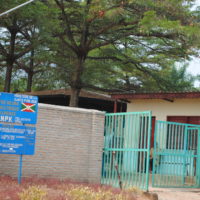Schizophrenia and other mental disorders should be given the same attention as other diseases, says Hypolite Manirakiza, director of the Kamenge Neuropsychiatric centre.-By Diane Uwimana
Hypolite Manirakiza and his collegeaus are preparing for the celebration of World Mental Health Day. The Kamenge Neuropsychiatric centre (CNPK) has implemented a community approach to bring about change in the society. “It is important to educate our people”, he says. Next week the center will organize a sensitization campaign and will go into communities, to tell them about the mental illness and ask them not to discriminate, but instead seek help.
When arriving at thecentreone doesn’t feel it belongs to people who have problems in their brain. It is a silent place.
“They live inside the centre. The patients are dispatched in different rooms according to their behavioural pattern, whether violent, stable or improving”, saysManirakiza.
“I broke and ate everything”
Evariste Nahimana, a father of five, from Ngozi province, is one of the patients of the CNPK. He belongs to the improved health category andtells us how he was affected. In 2008 he noticed some bizarre behaviour. “One day, I woke up late in the evening and jumped through the window of my bedroom. After that I began to break and eat everything I found on my way. My wife and neighbourstold me that it was not normal. They tied me up and brought me here. Before taking medication, I accused them of ethnic discrimination. I didn’t realise and understand what happened. But step by step, I recognize that I have some troubles in my brain.”
He suffers from Schizophrenia disease, Manirakiza explains. Schizophrenia is a mental disorder that generally appears in late adolescence or early adulthood. However, it can emerge at any time in life. It is one of many brain diseases that may include delusions, loss of personality, confusion, agitation, social withdrawal, psychosis and bizarre behaviour. According to Dr Désiré Nsabiyandemye, schizophrenia is a severe psychosis occurring in adulthood, usually chronic, clinically characterized by signs of dissociative behaviour, emotional conflict and delirious inconsistent activity. It generally results in breaking contact with the outside world and sometimes autism withdrawal.
There is no clear-cut diagnostic for schizophrenia. The diagnosis is made by a set of criteria both symptomatic and scalable. Diagnostic caution at the beginning of the disease is the rule, since it might not be clear if it is indeed schizophrenia when the disorder first starts progressing.
National strategy for mentally ill
Hypolite Manirakiza indicatesthat the number of mentally ill is rising. “The main causes are what we have endured as acountry, such as war, poverty, hatred, unemployment, violence and disrupted families.People are now disoriented and things go from bad to worse. Burundians do not fear dead, but step by step they become sick”, he regrets. Seeking treatment is not easy. Nahimana mentions the cost for transport fees. Requesting an administrative and medical insurance card may take days due to the lack of money, he adds.
“The Ministry of National Solidarity helps us by paying some medicine fees if the patient is poor.” But that is not enough.
Manirakiza believes that the only thing that can improve mental health is when the government implements a national strategy for the mentally ill, similar to the strategies already in place against malaria and people living with HIV/AIDS.
CNPK has 127 mentally ill persons, 41 women and 86 men, of which the majority suffersfrom schizophrenia.
“Each of the patients pay an amount of BIF 40 to 50 thousands per month for the medicine and the majority of them are poor and do not cover all the necessary costs for their treatment.”
The Ministry of National solidarity offers an amount of BIF 250 million per year to this centre.

















 IWACU Open Data
IWACU Open Data

